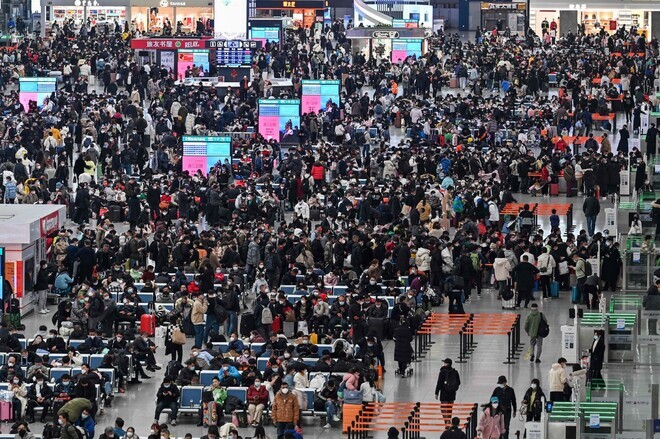hankyoreh
Links to other country sites 다른 나라 사이트 링크
China defends visa stoppage for Korea, Japan as response to “discrimination”

In response to questions about why it has suspended the issuance of visas to South Korea and Japan while not acting against the US and Europe, China has stated that this response is “based on discrimination against China.”
Wang Wenbin, the spokesperson of China’s Foreign Ministry replied to a question he received in his regular press conference on Thursday as to why China hasn’t taken reciprocal measures against the US and some European countries that, like South Korea and Japan, have adopted restriction measures.
“We have made it clear that China has taken reciprocal measures in response to relevant countries’ actual discriminatory measures against China.”
They are arguing that China responded according to the measures of other countries, instead of differentiating responses by country.
This argument is half correct, and half wrong. There are around 15 countries that have recently imposed regulations on arrivals from China, including the European Union, and the intensity of regulations varies slightly from country to country.
Morocco took the strongest measure, by banning travelers from China, while South Korea took the next strongest measure, by stopping visa issuance.
Three countries, South Korea, Japan, and Taiwan, are implementing “full-scale post-entry investigations,” while other countries are going through less harsh measures such as “mandatory pre-entry inspections,” and “random post-entry investigations.”
Some say that Europe and the US are conducting random investigations instead of full-scale post entry investigations for the sake of efficiency but also because their inspection capabilities are lacking.
In conclusion, four countries — Morocco, South Korea, Japan and Taiwan — have taken relatively strong measures against China, but China has only retaliated against South Korea and Japan.
Of course, Japan strongly opposes this measure. Japan has not stopped issuing visas to China, but since China has done so to Japan, it cannot escape criticism saying that it has exceeded the level of “corresponding measures.”
Related questions were asked at a briefing by China’s Foreign Ministry on Wednesday. To a question from Japan’s Fuji TV asking why responses weren’t reciprocal in this case.
“We have pointed out many times that a handful of countries, in disregard of science and their actual epidemic situation, have insisted on taking discriminatory entry restriction measures against travelers arriving from China,” responded Wang. “China responded to certain countries’ discriminatory action with reciprocal measures. This is to protect our fellow citizens’ legitimate rights and interests and make sure the environment is suitable for normal exchange and cooperation between countries, which is fair and legitimate.”
Yet the at-length response failed to answer the original question of whether the measures taken by China were, in fact, reciprocal.
“It was regrettable that China’s suspension of visa issuance was restricted for measures not related to COVID-19,” stated Japanese Foreign Minister Yoshimasa Hayashi on Wednesday.
On Thursday, the Yomiuri Shimbun newspaper interpreted that this happened because the Chinese government was “putting face over the economy.”
In such circumstances, it will not be easy for China to immediately strengthen measures such as suspending visa issuance to the US and European countries. It can mimic the measures taken up by those countries, such as the “mandatory pre-entry inspections,” and “random post-entry investigations,” but China is already applying “mandatory testing 48 hours pre-entry” to all overseas arrivals.
They may be able to add “random post-entry investigations,” but that is not as significant as a “corresponding” measure.
By Choi Hyun-june, Beijing correspondent
Please direct questions or comments to [english@hani.co.kr]

Editorial・opinion
![[Column] Samsung’s ‘lost decade’ and Lee Jae-yong’s mismatched chopsticks [Column] Samsung’s ‘lost decade’ and Lee Jae-yong’s mismatched chopsticks](https://flexible.img.hani.co.kr/flexible/normal/500/300/imgdb/original/2024/0512/3017154788490114.jpg) [Column] Samsung’s ‘lost decade’ and Lee Jae-yong’s mismatched chopsticks
[Column] Samsung’s ‘lost decade’ and Lee Jae-yong’s mismatched chopsticks![[Correspondent’s column] The real reason the US is worried about Chinese ‘overcapacity’ [Correspondent’s column] The real reason the US is worried about Chinese ‘overcapacity’](https://flexible.img.hani.co.kr/flexible/normal/500/300/imgdb/original/2024/0510/5217153290112576.jpg) [Correspondent’s column] The real reason the US is worried about Chinese ‘overcapacity’
[Correspondent’s column] The real reason the US is worried about Chinese ‘overcapacity’- [Editorial] Yoon’s gesture at communication only highlights his reluctance to change
- [Editorial] Perilous stakes of Trump’s rhetoric around US troop pullout from Korea
- [Guest essay] Preventing Korean Peninsula from becoming front line of new cold war
- [Column] The state is back — but is it in business?
- [Column] Life on our Trisolaris
- [Editorial] Penalties for airing allegations against Korea’s first lady endanger free press
- [Editorial] Yoon must halt procurement of SM-3 interceptor missiles
- [Guest essay] Maybe Korea’s rapid population decline is an opportunity, not a crisis
Most viewed articles
- 1Seoul’s plan to adopt SM-3 missiles is like wanting a sledgehammer to catch a fly
- 2[Column] Samsung’s ‘lost decade’ and Lee Jae-yong’s mismatched chopsticks
- 3[Correspondent’s column] The real reason the US is worried about Chinese ‘overcapacity’
- 4Yoon rejects calls for special counsel probes into Marine’s death, first lady in long-awaited presse
- 5Korea poised to overtake Taiwan as world’s No. 2 chip producer by 2032
- 6Yoon voices ‘trust’ in Japanese counterpart, says alliance with US won’t change
- 7US expert says THAAD can’t distinguish between real and decoy warheads
- 846% of cases of violence against women in Korea perpetrated by intimate partner, study finds
- 9S. Korea “monitoring developments” after report of secret Chinese police station in Seoul
- 10‘We must say no’: Seoul defense chief on Korean, USFK involvement in hypothetical Taiwan crisis